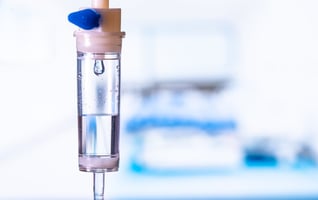Study Examines Efficacy of Esketamine-Antidepressant Combo in Older Adults With Treatment-Resistant Depression
 |
The study was funded by Janssen, who markets intranasal esketamine. (The drug was approved by the Food and Drug Administration earlier this year for treatment-resistant depression.)
The researchers randomly assigned 138 patients 65 years or older with treatment-resistant depression to take intranasal esketamine or placebo twice weekly in addition to a new oral antidepressant daily for four weeks. Patients initially received 28 mg of esketamine or the placebo nasal spray, but the investigators increased the esketamine dose to 56 mg or 84 mg based on the patients’ response to the treatment. The primary endpoint was change in the Montgomery- Åsberg Depression Rating Scale (MADRS) from baseline to day 28. Secondary measures included the percentage of patients who showed a treatment response (defined as a 50% or greater reduction in MADRS score) and rates of remission (defined as a MADRS score of 12 or less).
The average change in MADRS score for patients taking antidepressant plus esketamine was 10 points compared with 6.3 for patients taking antidepressant plus placebo. Treatment response was observed in 27% of patients receiving esketamine and 13.3% receiving placebo. Remission rates were 17.5% in the esketamine group and 6.7% in the placebo group.
The difference between the esketamine and placebo groups on the primary endpoint of overall symptom reduction was not statistically significant. This failure to achieve statistical significance may be related to lower dosing required in older patients and a need for longer treatment duration, the researchers wrote.
Additional analysis revealed that there was a greater reduction in total symptom scores among individuals aged 65 to 74 treated with esketamine compared with placebo that was not observed in patients aged 75 years or older, suggesting that the combination may benefit a younger subset of seniors.
“Given the need for treatments for [treatment-resistant depression in older adults] and the potential role of esketamine, future studies are needed to establish if esketamine is effective in [treatment-resistant depression in older adults] and if so the optimal induction/optimization/maintenance dosing and duration of treatment,” Helen Lavretsky, M.D., M.S., of the Semel Institute for Neuroscience and Human Behavior at UCLA and Steven P. Roose, M.D., of New York State Psychiatric Institute, wrote in an accompanying editorial. “There is much work to do but the exciting news is that studies are underway and hopefully new esketamine studies will be initiated that will provide the clinician with the information necessary to alter the deleterious trajectory associated with this high-risk population and difficult to treat population,” they wrote.
For related information, see the Psychiatric News article “Esketamine Approved For Treatment-Resistant Depression.”
(Image: iStock/asadykov)
Follow Psychiatric News on Twitter!
And check out the new Psychiatric News Brief on Alexa-enabled devices.
And check out the new Psychiatric News Brief on Alexa-enabled devices.




